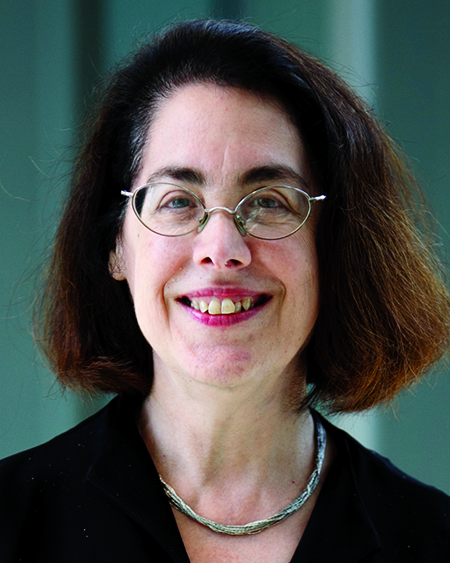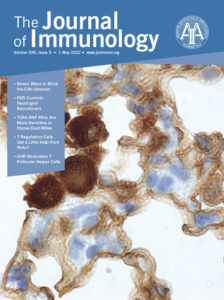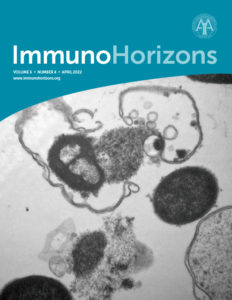Arlene H. Sharpe
Harvard Med. Sch.

Arlene H. Sharpe, M.D., Ph.D., DFAAI (AAI ’96), Harvard Medical School, Broad Institute, and Brigham and Women’s Hospital, is the recipient of the 2022 AAI Lifetime Achievement Award in recognition of a career of extraordinary scientific achievement and exceptional leadership and service to AAI. This award is the highest honor bestowed by the AAI Council upon an AAI member.
Dr. Sharpe’s research has been and continues to be integral to understanding the immunoregulatory functions of a variety of T cell costimulatory and coinhibitory pathways. These pathways are essential to understanding and manipulating immune responses. Appropriate engagement of these receptors mediates immune protection from pathogens and cancer, and protection from injurious immune responses to allergens, autoantigens, or transplanted tissue antigens. Conversely, coinhibitory receptors are expressed on the cell surface of phenotypically senescent and exhausted T cells. Immune senescence is a corollary of aging, and T cell exhaustion is a feature of chronic antigen exposure. Both are characterized by a decline in immune responses and blocking coinhibitory receptors may restore T cell responses. Sharpe’s laboratory uses a variety of genetic tools to address these issues and dissect the function and consequences of engagement of these molecules in murine models of disease and works to translate these findings into therapies for chronic viral infections, cancer, and autoimmune diseases.
Her work with B7-1 and B7-2 (CD80 and CD86) has demonstrated the essential role of these molecules in initiating immune responses and their contributions to germinal center formation and B cell immunoglobulin class switching; and to T cell activation, differentiation, and interleukin (IL)-2 production. Her laboratory also described a role for B7-1 and B7-2 costimulation in driving autoimmune disease. Currently, the B7-1/ B7-2 blocking agent, cytotoxic T lymphocyte antigen-4 (CTLA-4)-4Ig, is used clinically to treat rheumatoid arthritis and prevent solid organ transplant rejection.
Sharpe has also described CTLA-4 as a key regulator of immune responses. In its absence, mice develop lymphoproliferative disease and fatal multiorgan tissue destruction. Her research has uncovered roles for CTLA-4 in regulating T cell tolerance, autoimmunity, and anergy. CTLA-4 and PD-1 also mediate and inhibit, respectively, the suppression exerted by T follicular regulatory (Tfr) cells, suggesting an additional mechanism by which these molecules affect B cell effector functions.
In addition to her studies on B7 and CTLA-4, Sharpe’s research group has described inducible costimulator (ICOS) as critical for T-dependent B cell immunoglobulin isotype class switching and germinal center formation. ICOS is also integral for T helper (Th) cell type 1 and 2 effector functions, Th17 and T follicular helper (Tfh) development, and mucosal tolerance.
Sharpe’s work also investigates how coinhibitory receptors are upregulated on antigen-experienced T cells and limit their capacity to respond to antigen challenge or re-challenge. Her laboratory demonstrated programmed death ligands 1 and 2 (PD-L1 and PD-L2) as key regulators of immune responses, because their interaction with programmed cell death protein (PD)- 1 inhibits T cell proliferation, activation, and cytokine production, while contributing to T cell exhaustion in both self- and foreign antigens. Understanding and manipulation of this pathway has implications for cancer, chronic viral infection, and immune tolerance.
Sharpe obtained her Ph.D. from Harvard University under the guidance of Dr. Bernard Fields, and her M.D. from Harvard Medical School. She completed her residency in pathology at Brigham and Women’s Hospital and then completed a postdoctoral fellowship at The Whitehead Institute in the laboratory of Dr. Rudolf Jaenisch. She continued her research at Harvard Medical School, rising in rank from an assistant professor. She is currently the George Fabyan Professor of Comparative Pathology, member of the Ludwig Center, and chair of the Department of Immunology at Harvard Medical School, with appointments as an associate member of the Broad Institute, senior scientist in pathology at Brigham and Women’s Hospital, and co-director of the Evergrande Center for Immunologic Diseases at Harvard Medical School and Brigham and Women’s Hospital.
Among her many honors, Sharpe is a member of both the National Academy of Medicine and the National Academy of Sciences, a National Institutes of Health MERIT award recipient, and a fellow of the American Association for the Advancement of Science, American Association for Cancer Research, National Academy of Inventors, and Society for Immunotherapy of Cancer Academy of Immuno-Oncology. She has been recognized by Thomson Reuters as a Highly Cited Researcher (top 1%).
Sharpe has been heavily involved with AAI. She is a past AAI Council member, culminating in her service as AAI President in 2016–2017. Sharpe has served as a member of the Program and Publications Committees. She has also been very involved with the AAI annual meetings as a Distinguished Lecturer and a major symposium chair and speaker.



